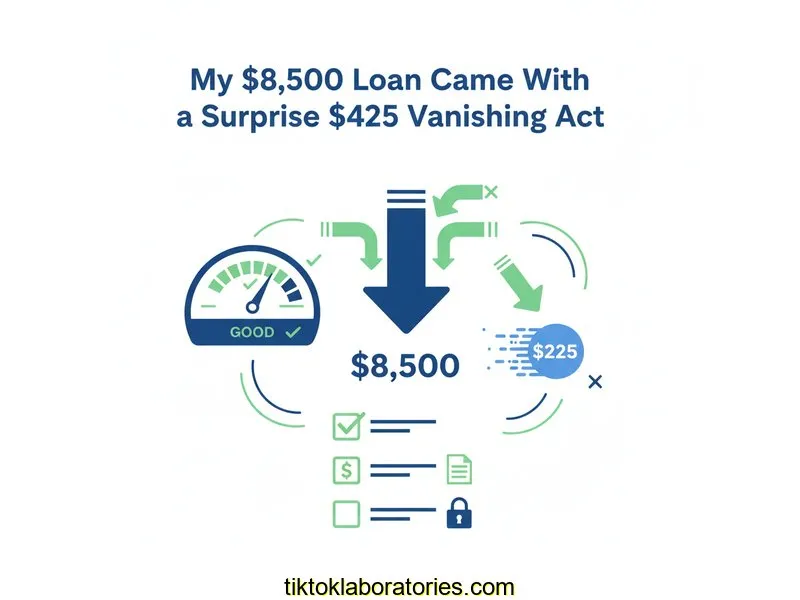
Auto Loan Calculator
Calculate payments over the life of your Loan
Home Blog Privacy Terms About Contact
Calculate payments over the life of your Loan
Home Blog Privacy Terms About ContactPublished on October 12, 2025

This is a personal story about my own loan experience and the mistakes I made. It is not financial advice. Please consult a qualified professional for your financial decisions.
It started with a clunk, then a groan, then silence. The kind of silence that’s deafening when it’s 98 degrees outside and the air inside your home is quickly turning into a swamp. My HVAC system, a rusty but faithful soldier for 15 years, had finally surrendered. This wasn't just an inconvenience; it was a full-blown domestic crisis during the peak of a brutal July heatwave.
The quotes from contractors came in fast and were uniformly terrifying. The verdict was a full replacement. The price tag? A stomach-churning $8,500. My emergency fund, which I had been so proud of building, had just taken a major hit from a necessary car repair a few months prior. There was simply not enough left to cover this.
The stress was immense. My family was miserable, sleeping with wet towels and multiple fans that just circulated the hot, thick air. I felt a desperate sense of urgency to fix it, to restore comfort and normalcy. It was this pressure, this emotional need to solve the problem *now*, that set the stage for my big mistake. I dove into the world of online personal loans, feeling a surge of relief when I found what I thought was the perfect solution.
I found a lender offering what looked like a fantastic deal: an 11.99% interest rate. In my mind, that was the only number that mattered. I fixated on it. It seemed reasonable, and the estimated monthly payment of around $220 felt completely manageable. I thought, "Great, I'll apply, get the money in a day or two, pay the HVAC guy, and this nightmare will be over." I was so focused on the interest rate and the speed of the solution that I was blind to everything else.
The application process was deceptively simple. I uploaded my documents, entered my information, and within a few hours, I had an official approval. A wave of relief washed over me. I saw the numbers on the screen—$8,500 loan, 48-month term, 11.99% interest. It all looked exactly as I had expected. A digital document popped up, asking for my signature. Eager to get the money and end the heatwave misery, I scrolled through it, my eyes scanning for that 11.99% figure, confirming the loan amount, and then I clicked "Agree."
I barely skimmed the pages of dense text. In my hurry, I told myself it was all standard boilerplate language. The money, I was told, would be deposited into my checking account within 24 hours. The next morning, I woke up early, logged into my online banking app with a sense of triumph, ready to call the HVAC company and tell them to start the work. But my heart sank into my stomach. The deposit was there, but the amount was wrong.
Instead of the $8,500 I was expecting, my account showed a deposit for $8,075. I blinked, refreshing the page, thinking it was a mistake. It wasn't. A cold knot of panic began to form. Where was the rest of my money? I was exactly $425 short, and that was money I absolutely needed for the final payment to the contractor.
My mind raced. Did I enter the wrong amount? Did they make a mistake? I immediately logged back into the lender's portal, my hands slightly shaking. I frantically clicked through the dashboard until I found a link to the "Final Loan Agreement" PDF—the very document I had so carelessly scrolled through. I opened it and started reading, this time with painstaking attention to every single word. And there it was, on page three, a line item I had completely ignored: "Loan Origination Fee: 5%."
The math was brutally simple: 5% of $8,500 is $425. The fee wasn't an extra charge; it was deducted directly from the loan amount before it ever reached me. I felt a wave of anger, mostly at myself. How could I have missed something so significant? The "great" interest rate I was so proud of had come with a hidden cost that put me in an immediate financial bind. The relief I had felt was replaced with pure dread at the thought of the awkward and embarrassing conversation I now had to have with the HVAC contractor.
Once the initial panic subsided, I was left with the frustrating reality of my oversight. To truly understand what went wrong, I had to break down my rushed actions against what a more careful approach would have looked like. It was a painful but necessary exercise in financial self-awareness. This experience wasn't just about missing a fee; it was about my entire approach to borrowing under pressure.
The core of my mistake was a fundamental misunderstanding of what to look for. I was so zeroed in on the interest rate that I couldn't see the bigger picture—the total cost of the loan. In my mind, a lower interest rate automatically meant a cheaper loan, but I learned that this isn't always the case, especially when fees are involved.
Looking back, I can clearly see the path I should have taken. It's not about being a financial genius; it's just about being methodical, even when stressed.
My first step should have been to ignore the "interest rate" in headlines and look only for the APR (Annual Percentage Rate). The APR provides a more complete picture because, by law, it generally must include certain fees. This one change in focus would have immediately alerted me that the total cost was higher than I thought.
Instead of falling for the first seemingly good offer, I would have used online tools to pre-qualify with my own bank, a local credit union, and at least two other online lenders. This doesn't hurt your credit score and would have given me a range of real APRs and fee structures to compare side-by-side.
With those offers, I would have made a quick chart comparing Loan Amount, APR, Origination Fee (in dollars), Monthly Payment, and Total Repayment Amount. Seeing the numbers laid out so starkly would have made the best financial choice obvious, not just the one that felt fastest.
Before signing anything, I would have located the official Loan Disclosure form. This document is designed to be clearer than the full agreement and explicitly lays out all the costs. I would have found that $425 fee in big, bold print and could have re-evaluated my choice.
My final check would have been to ask the lender a direct question via chat or phone: "To be crystal clear, if I am approved for an $8,500 loan, will the amount deposited into my bank account be exactly $8,500?" This simple question would have saved me from the shock and panic I experienced.

This $425 mistake was a surprisingly effective, if painful, teacher. It forced me to re-evaluate how I approach major financial decisions, especially when I'm under duress. From this experience, I've developed a set of personal rules that I will follow for any future borrowing needs. These aren't advice for anyone else, but rather my own hard-learned guardrails.
In the weeks after the new HVAC was installed and my home was blissfully cool again, I spent a lot of time thinking about how I ended up in that situation. It wasn't just about money; it was about my mindset. I've asked myself a few key questions to process the lesson.
In my case, the answer was simple: I was experiencing tunnel vision. The emotional stress of my family's discomfort made me focus on one thing: speed. I wasn't looking for the best deal; I was looking for the fastest solution. This emotional filter made me blind to details that would have been obvious in a calmer state of mind. Your experience may be completely different, but for me, emotion was the enemy of diligence.
I don't think it was a "trick" in a malicious sense, but it was certainly a marketing strategy. A loan with a lower interest rate and a high fee can look more appealing at first glance than a loan with a slightly higher interest rate and no fee. I learned that lenders have different models, and it was my responsibility to understand the full picture of the offer, not just the headline number.
The immediate damage was the $425 I had to scramble to cover. I ended up having to put that amount on a credit card, which temporarily defeated part of the purpose of getting the loan in the first place. Longer-term, while the loan is still manageable, I know that another loan with a slightly higher APR but no origination fee might have saved me a couple of hundred dollars over the 48 months. It was a tangible, albeit not catastrophic, financial loss.
Yes, I probably would if I were in a similar situation without enough in my emergency fund. The tool itself wasn't the problem; my use of the tool was. What's changed is my approach. I now see a personal loan not as a quick-fix button but as a serious financial product that requires careful research and comparison, no matter how urgent the need feels.
The single most important lesson I will carry with me from this experience is that financial diligence is most critical when you feel you have the least amount of time for it. Urgency is a powerful force that can push you to make sloppy, expensive mistakes. The need to solve a problem quickly can easily override the need to solve it wisely.
That $425 fee was the price of my financial education. It taught me to take a deep breath, slow down, and trust that an extra day of research is far less painful than years of paying for a hasty decision. If my story can serve as a reminder of that, then sharing my embarrassing oversight is worth it.
I'm now paying off that loan every month, and every payment is a small reminder. It’s a reminder to read the fine print, to compare all the numbers, and to never let panic make my financial choices for me.
All the best on your journey,
Alex
Remember, this is just my personal story and the financial path I walked. Always consult with a qualified financial advisor for your specific situation.
Disclaimer: This article documents my personal experience with a loan. This is not financial advice. Your own situation, creditworthiness, and loan options will differ. I am not a financial professional. Always consult with a qualified financial advisor, review all loan documents carefully, and compare multiple lenders before making any financial decisions. Loan terms, rates, and fees vary widely.
About the Author: Written by Alex, someone who has navigated the world of personal finance for over 8 years, making plenty of mistakes and learning from them along the way. I'm not a financial advisor or loan officer—just an individual sharing personal stories to help others feel less alone in their financial journey. My experiences are my own; always seek professional guidance for your specific needs.